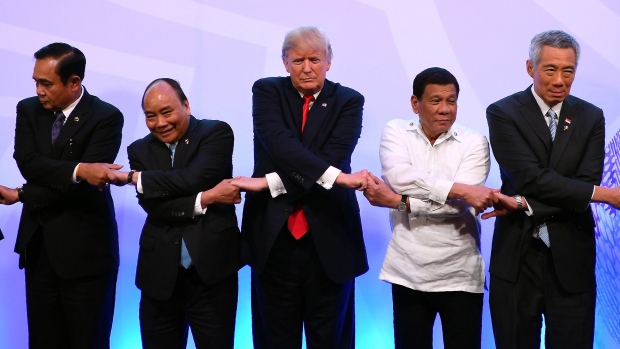Nov 13, 2017
Trump offers to broker South China Sea dispute resolution
, Bloomberg News

U.S. President Donald Trump offered to help resolve territorial disputes in the South China Sea as he entered the final leg of his 11-day swing through Asia.
Trump is scheduled to meet Philippine President Rodrigo Duterte on Monday as he attends two days of meetings on regional security affairs hosted by the Association of Southeast Asian Nations before heading home. A key discussion point will be how to lower tensions in the South China Sea, a major global shipping lane that contains oil and gas reserves.
“I am a very good mediator and a very good arbitrator,” Trump said Sunday in Hanoi ahead of a meeting with Vietnamese President Tran Dai Quang. “If I can be of help in any way, let me know.”
Both the Philippines and Vietnam have recently seen China disrupt oil and gas exploration in disputed areas of the South China Sea. While the U.S. doesn’t take a position on territorial disputes, it has criticized China for land reclamation and other moves to assert control over areas also claimed in part by Southeast Asian countries.
It was unclear if Trump’s offhand remark signaled a more proactive U.S. role in finding a solution to one of Asia’s biggest flashpoints. Trump has primarily focused his attention on North Korea’s nuclear program, a shift from the Obama administration’s more aggressive stance against China’s activities in the South China Sea.
‘Good Mediator’
Vietnam’s Quang didn’t answer directly when asked later about Trump’s offer to mediate at a joint press briefing in Hanoi.
“I have shared my thoughts with President Donald Trump on the recent developments in this area,” he said, adding that Vietnam wanted to settle disputes through “peaceful negotiations” in accordance with international law.
The Philippines cautiously welcomed Trump’s offer, though officials said that any effort would need to be coordinated among other countries in the region.
It’s “a very kind and generous offer because he is a good mediator,” Foreign Secretary Alan Peter Cayetano told reporters in Manila. “He is the master of the art of the deal.”
Duterte, who has sought warmer relations with China since taking office last year, warned on Sunday that a war over the waterway would devastate the region. He said that Chinese President Xi Jinping told him on Saturday that he also didn’t want to “waste the lives of my countrymen for a useless war that cannot be won by anyone.”
‘Better Left Untouched’
“The South China Sea is better left untouched,” Duterte said. “Nobody can afford to go to war.”
China opposes U.S. involvement in resolving the disputes, preferring to settle them through one-on-one talks with other nations. Relations between China and the Philippines have opened a new chapter after Duterte’s visit in October, China’s official Xinhua News Agency quoted Xi as saying after the meeting.
The 10-nation Asean is set to announce Monday the start of negotiations with China on a code of conduct in the South China Sea, the Philippines said in a statement. The talks have made little progress since the nations agreed formally to work toward a code in 2002.
The tough-talking Duterte is famed for his profanity-riddled outbursts, including at then-U.S. President Barack Obama. He has spoken more warmly of Trump, another leader known for his bluntness. Under Obama’s administration, Duterte said he wanted to “cut the cord” with the U.S. over its criticism of his violent war on drugs in the Philippines, which has seen thousands killed.
He subsequently pivoted toward China, de-escalating tensions with Beijing over their competing South China Sea claims and winning $24 billion worth of Chinese loans and investment in the Philippines. The archipelago nation is dwarfed militarily and economically by China, and has a longstanding security treaty with the U.S.
Trump is set to head back to the U.S. on Tuesday. Hundreds of people protested his arrival in Manila on Sunday, with leftist groups pledging to burn American flags.

